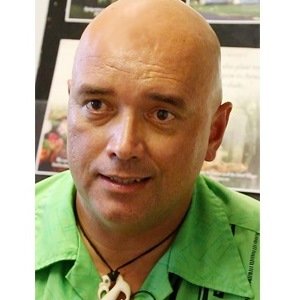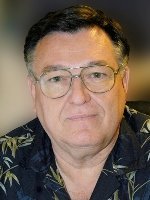Over the years the Polynesian Cultural Center has used various human resource training programs, many of them recognized around the world, but recently the PCC is taking a new tack — or more correctly, is turning to ancient Polynesian values to instill a PCC-specific spirit of excellence in all the people who work at this unique place.
Seamus Fitzgerald is the Director of Talent Management and has been challenged to develop our own program to “strengthen the organization so we can achieve our key objectives with excellence.”
 Fitzgerald — a Māori originally from Turangi, New Zealand, who first came to the PCC as a BYU–Hawaii student worker in 1994 — has distinguished himself, in the Center’s Islands of Aotearoa and various other groups since then with his passion for sharing Māori culture. He was named manager of the Aotearoa Village in 2009 and Director of all the PCC islands in 2013. Along the way he earned degrees here in Pacific Islands Studies and back in New Zealand in Māori performing arts and Māori philosophy.
Fitzgerald — a Māori originally from Turangi, New Zealand, who first came to the PCC as a BYU–Hawaii student worker in 1994 — has distinguished himself, in the Center’s Islands of Aotearoa and various other groups since then with his passion for sharing Māori culture. He was named manager of the Aotearoa Village in 2009 and Director of all the PCC islands in 2013. Along the way he earned degrees here in Pacific Islands Studies and back in New Zealand in Māori performing arts and Māori philosophy.
“I’ve also learned a lot here at the Cultural Center,” he continued, noting that he has used some of the ancient wisdom that helped Polynesian ancestors survive in the new training program. “I’ve been spending the last few months putting this all together.”
Fitzgerald rhetorically asks, how do we help our leaders, coworkers, and organization apply such lessons? “Speaking it, I could say, what are you doing to strengthen the company, or I could say, what are you doing to mālama PCC? There’s more ownership in the latter, because we understand mālama — a value that helped our ancestors succeed and survive.”
Fitzgerald explained he relies on PCC’s own cultural specialists as the source of such knowledge. For example, Uncle CyBridges, a recently retired Hawaiian culture expert, “reminded us what a pu’uhonua is and what its significance to Laie is, and how we’ve able to practice those concepts.”
“Anciently, Laie was seen as a sacred place because it was a pu’uhonua or a place you could come to for healing if you had broken laws or kapu. If there was a war on, you could come to Laie and be safe.”
“All of our training modules begin with the word ‘see,’ because we know at the core of culture what you see determines your values and beliefs; and ultimately what you do comes from seeing. How you see something governs the value you put on it.”
“A greater sense of helpfulness is something we’re trying to instill in our people,” he said, “so we’ve also implemented a hui kōkua or meet to help: Putting that into a corporate exercise, every manager now goes to all of his or her direct reports weekly and says, how can I help you succeed? Or asks, what’s your biggest challenge this week? How can I help you with that? And in doing so, the spirit of the pu’uhonua lives on.”
Fitzgerald said he will initially share one of six modules each month, which will be repeated. He also said there are additional exercises and activities. “Just like in any other corporate training, there are invitations and accountability with each module, the difference is that our training is brand new and has never been done before. They belong to the Center. It’s our culture. It’s our history. It’s our vision. It’s our way of doing things, which is our competitive edge to help us achieve our goals.”
“Because of my history here at the Center on and off for the last 21 years, I’ve come to the conclusion that they could ask me to do anything they want me to do. What’s more important is how I do it. I need to do it the very best I can for the many who paved the way for us at the Cultural Center, for the prophets and visions that have helped create this place, and for what it’s done for me and for my family.”
Story and images by Mike Foley

Mike Foley, who has worked off-and-on
at the Polynesian Cultural Center since
1968, has been a full-time freelance
writer and digital media specialist since
2002, and had a long career in marketing
communications and PR before that. He
learned to speak fluent Samoan as a
Mormon missionary before moving to Laie
in 1967 — still does, and he has traveled
extensively over the years throughout
Polynesia and other Pacific islands. Foley
is mostly retired now, but continues to
contribute to various PCC and other media.

Recent Comments